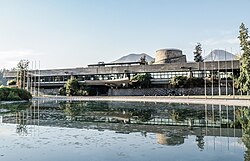
The United Nations Economic Commission for Latin America and the Caribbean (UNECLAC, ECLAC or CEPAL, in Spanish: Comisión Económica para América Latina y el Caribe) is a United Nations regional commission to encourage economic cooperation. The ECLAC includes 46 member states (20 in Latin America, 13 in the Caribbean and 13 from outside the region), and 14 associate members which are various non-independent territories, associated island countries and a commonwealth in the Caribbean. The ECLAC publishes statistics covering the countries of the region[3] and makes cooperative agreements with nonprofit institutions.[4] The headquarters of ECLAC is in Santiago, Chile.
The ECLAC was established in 1948 as the UN Economic Commission for Latin America.[5][6] In 1984, a resolution was passed to include the countries of the Caribbean in the name.[7] It reports to the UN Economic and Social Council (ECOSOC).
The following are all member states of ECLAC:[8]
The following are all associate members of the ECLAC:[8]

| Name | Country | Served |
|---|---|---|
| José Manuel Salazar-Xirinachs | September 2022 – | |
| Alicia Bárcena Ibarra | July 2008 – March 2022 | |
| José Luis Machinea | December 2003 – June 2008 | |
| José Antonio Ocampo | January 1998 – August 2003 | |
| Gert Rosenthal | January 1988 – December 1997 | |
| Norberto González | March 1985 – December 1987 | |
| Enrique V. Iglesias | April 1972 – February 1985 | |
| Carlos Quintana | January 1967 – March 1972 | |
| José Antonio Mayobre | August 1963 – December 1966 | |
| Raúl Prebisch | May 1950 – July 1963 | |
| Gustavo Martínez Cabañas | December 1948 – April 1950 |
A mapping of the ECLAC’s activities to the Sustainable Development Goals (in 2023) shows that its current work emphasizes four SDGs; namely, SDG 17 on partnerships, SDG 8 on decent work, SDG 10 on reduced inequalities, and SDG 16 on peace and justice. In practice, the ECLAC strives toward its own regional paradigm, called Global Environmental Keynesianism, which promotes multidimensional equality as the purpose of development. The commission seeks to balance the new SDGs with its earlier focus on equality and to better emphasize the environmental dimension of economic development.[9]
The ECLAC has been working on a debt-swap strategy since 2016, titled the Debt for Climate Adaptation Swap and Caribbean Resilience Fund. This fund aims to reduce the debt and fiscal constraints for investment in green industries, stimulate growth, promote economic transformation, and expand fiscal space for public investment such as for the SDGs.[9]